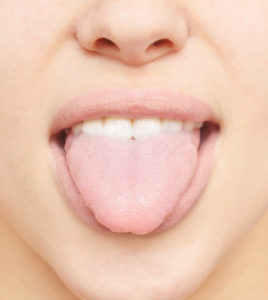
We figuratively bite our tongue to try to prevent a verbal miscue; and we accidentally bite our tongue when eating or speaking. The actual bite can be painful, but is generally not serious.
Tongues work in conjunction with the teeth to form words allowing us to speak clearly.
Our tongue provides the sense of taste … hot, cold, bitter, sweet, tangy or bland … our tongue allows us to experience all of these senses.
Problems associated with our tongue can be varied and minor. Or they can be serious and life threatening. That is why any unusual symptom or change should be called to the attention of your dentist for examination.
Canker sores can occur throughout the mouth … they are not serious, but can create discomfort that can last ten days to two weeks making eating and speaking difficult.
Bumps, minor sores, discolorations, or indentations that look like cracks in the tongue are most often not serious; however, whenever a change occurs in any part of your dental make-up, it is best to have the change examined for a correct diagnosis.
Oral cancer can start out as a small innocuous sore, but the end result can be extremely serious if not examined and caught early enough to treat.
Some diseases that affect other parts of the body can also have an impact on the appearance of the tongue. Most notable among these illnesses is diabetes.
Some patients develop a “hairy tongue”. Of course hair does not actually grow from the tongue; however, there are tendrils that grow from the tongue that may turn black giving them the appearance of hair growing. Although not dangerous, the appearance is undesirable.
The tongue may harbor bacteria that can lead to halitosis. There are aids available to cleanse the tongue, however, many patients will brush their tongue at the same time they brush their teeth.
Any change in the appearance or sensations of the tongue should be checked for the potential for disease or illness, but the majority of tongue blemishes will result from surface bites, burns or harmless sores that are not serious.
For more tips about taking care of your tongue, call our dental office at 972-458-2464 today.
